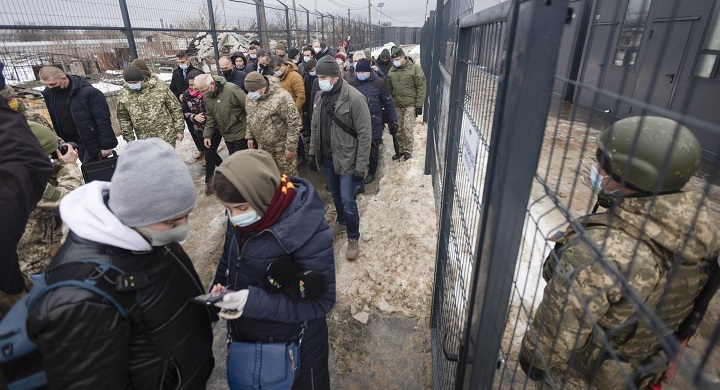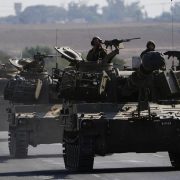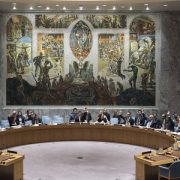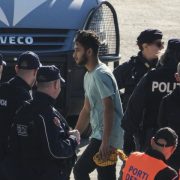
The geopolitical continuity of the Eurasian continent is millennia old. It harks back to Indo-Europeans spreading to Europe and South Asia, from the Eurasian heartland to the Huns, the Turks, and the Mongols roaming around the huge landmass following their strategic goals. It is a constant pattern, until recently when the Soviets stoked fire in Asia—in the 1950s war in Korea and only a little later in the war in Vietnam, first against the French then against the Americans—to distract the West from the main theater in Europe.
Perhaps the same is happening now with Ukraine.
Will China get entangled in a low- or high-intensity war in Ukraine along with Russia? Would Russia support China if it decided to move on Taiwan or in the South China Sea? Would the two countries coordinate parallel attacks on Taiwan by China and Ukraine by Russia to divert American attention?
Ties between Russia and China are not easy or straightforward. China, for centuries, has been wary of strategic threats coming from the north. Invasions or just pressure from the northern nomadic and semi-nomadic populations have been a main concern since the establishment of agricultural societies in the Yellow River basin.
Since its westward drive in the 18th century, Russia has been pushing against the power in Beijing, and after the fall of the USSR, has been worried that semi-deserted Siberia could be taken over by dynamic and overpopulated China from the south. They fought one last border war in the early 1970s, and in 1979, when China attacked Vietnam, Moscow supported Hanoi.
Still, the two countries know each other well, have an old tradition of mutual dealings, and felt drawn together by the separate pressures coming from the United States and its allies to the east and west in the past decade.
Moreover, despite all its old concerns about Russia, China is buying over $400 billion dollars of gas from Russia, brought in through new pipelines. The agreement didn’t go forward for years because the two sides were haggling over the price. Then it became a strategic move.
China started feeling that the American navy could cut off its maritime routes, so the Russian supply lines became strategically very important. This gas deal, of course, works both ways. It is vital for Russia, too, especially if the Russian-European pipeline Nord Stream 2 doesn’t come to full fruition because of the growing attrition in Europe.
This month, Russia “regained control” over Kazakhstan, which was improving ties with the US. Therefore, it solved a problem for Beijing, worried that Kazakhstan could become a base for destabilization in Xinjiang.
On the other hand, Beijing may be watching how the situation in Ukraine is playing out. If the US shows weakness there, Beijing might get the message that America is not willing to draw a line with Russia and maybe not even with China. On the other hand, if the US or the West gets bogged down in a conflict in Ukraine, then Beijing may think that Washington is distracted from the Asian front.
Different Asias
Furthermore, if Russia is concentrated on Europe, this leaves more room in Asia for China. Still, Russia’s agenda in Asia is specific. Greater Russian involvement in Central Asia means less breathing space for China, although Beijing botched many Central Asian moves. Moscow has traditionally good ties with Hanoi and New Delhi, both Beijing’s adversaries, who have recently grown closer to Japan, Australia, and America.
These may not be the only differences.
Russia wants to push NATO as far back as it can to recover an old Soviet space, but China has little to do with this. Russian actions are reviving NATO, which was almost a zombie-like institution. It could be a necessary price for Moscow, but for Beijing? Why should it align itself against NATO, when there are Europeans who were previously reluctant to engage against China but could become more eager if they see China siding with Russia? Then bringing back from the dead a military alliance that could also be used against China, when it was in slumber until a few months ago, is not good news for China.
The Russian troops around Ukraine are facing a distracted Europe that was still dreaming of becoming a giant Switzerland, independent but neutral, until a few weeks ago.
In a little more than a decade, Russia broke up Georgia, stopped the jasmine revolution in Syria and secured its naval base there, annexed Crimea, sent troops to Libya and Africa, supported Armenia against Azerbaijan, and “took over” Kazakhstan. This can’t go on forever. Europe is getting scared, including Germany, which had been willing to appease. If Ukraine falls, the Baltics and Poland are next, and Germany goes back to being on the frontline.
On the other hand, if Beijing supports Moscow in handling NATO, it doesn’t necessarily mean Russia will reciprocate in the near future. There are mutual suspicions, and the diverging interests in the face of Ukraine show the deep fissures in the “alliance.”
China can afford to sit back and watch, but Putin’s Russia might be overstretching. Reawakening NATO in the West and giving China cold feet brings Russia back to the strategic isolation it evaded for two decades. In about twenty years American hyper-activism in Central Asia and the Middle East progressively irked many supportive allies. Now, the whole Eurasian game is changing and Russia and China may have different priorities here.






Kazakhstan had very good relations but has now become a very important link in China’s BRI world economic development program. A protest against the price increase of LPG suddenly transformed into an armed insurrection that was suppressed with some help from fellow members of CSTO. Was the insurrection premature because US was in a hurry to disrupt BRI before the verdict from the MH17 would be in?
While US sees its satellite Taiwan, that according to the constitution of the Republic of China is part of China, as an essential link in its chain of bases threatening China its regime is not actually preparing for war. It is buying weapons in US for billions of dollars to appease that country’s military-industrial complex but its conscript soldiers only serve for four months. Its largest company TSMC is investing a huge amount next years not only in new fabs but also in factories to produce material it is now importing apparently to be able to continue production after the island is taken over by China and US institutes sanctions.
This is a truly absurd article.
I will limit myself here to Ukraine.
US twice organized a coup in Kiev, in 2005 and 2014. The first time Russia was still to weak to react but the regime didn’t stick. The second time round the first thing the newly purged parliament did was to enact a law – not signed by the provisional president – to make all communications between citizens and the state organs in the language of the largest minority – Ukrainian. This was enough for the parliament of autonomous Crimea to declare itself independent and to organize a referendum in which a large majority of the franchise voted for accession to the Russian Federation. This protected the Russian naval base Sevastopol agaist expulsion by the new US satellite in Kiev.
Russia also organized a rebellion in Donbas which began a month later because it was essential to first set up an air defense. To that end Russia sent shoulder launched anti aircraft missiles and trained their operators and I suppose supported those operators by warnig them when a target would appear near them. The threat of air attack by Su-25 aircraft and helicopters was elimnated in six months time.
In June 2014 the rebels took a Buk Transporter-Erector-Launcher from a Ukrainian army base which was unable to launch any missile, a fact that must have been known in Kiev. On July 14 an An-26 of the Ukrainian air force was shot near Luhansk and Kiev said it was flying at an altitude of about six km when it was hit – implying that the rebels had used a Buk missile. Within a few hours a photo on internet showed it lacked the holes caused by shrapnel from an explosing Buk war head proving that Kiev lied. Three days later KIev shot down MH17 and blamed the rebels.
Two days later the Netherlands set up the Joint Instigation Team consisting of itself, Belgium, Malaysia and Australia and excluding Russia and Ukraine, the proper procedure. After another three days Ukraine was included thus fitting JIT with blinkers. Ukraine got the task of collecting and translating material in Russian and Ukrainian. JIT collected evidence against the rebels but after thirteen months it said the Buk TEL in the hads of the rebels had been unable to launch any missile – without telling us how it reached that conclusion and why so late. So now it collected evidence against Russia because Ukraine was part of the team.
The MH17 trial is now nearing its end ad soon the defense, of one of the four accused, will speak for the first time. He will have the opportunity to use an item from the prosecutio published in my Dutch newspaper NRC, http://www.nrc.nl, on December 23 about a telephone call by one of the accused with a leader in Crimea in which he demanded a Buk TEL the next day which according to other intercepted calls was necessary because otherwise the rebellion would fail. And next day MH17 was shot down. These telephone calls fit no way in the way the war was fought at the time. The use of Buk missiles would be less effective against the air threat against the rebels than the shoulder launched weapons that were provided, it would need the use of manifestly well trained Russian personnel and the lauchers would be vulnerable to long range artillery fire. The evidence is clearly fake and provided by Kiev.
Russia will not start a war to take attention away from the MH17 trial but has concentrated forces to deter or destroy any Kiev adventurism to drown news about the trial.
I don’t doubt that the rebels took that otherwise useless Bu TEL from that army base to “invite” Kiev to commit that horrendous crime of shooting down an airliner.
sem rodeios ,um jornalista que se presta a esse papel não é e nunca será jornalista e sim um babaca qualquer que se encontra em qualquer esquina,um lumpen querendo ser….
analbeto de pai e mãe,sem saída possível a não ser escrever publicidade de baixo impacto
This is not an analysis, it is pure wishful thinking. Whatever differences China and Russia may have had in the past, presently their interests are very much the same and therefore they are bound to work together. They may even finally decide on signing a formal defense alliance against the US and its disruptive policies all over the world. We will soon see the way it goes.